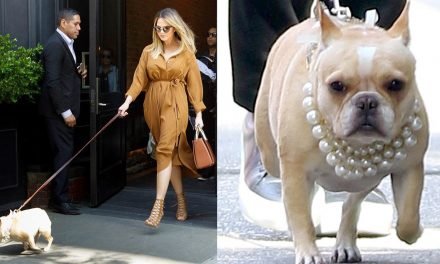
Are Goldendoodles Good Emotional Support Dogs?

The Goldendoodle — a cross between the golden retriever and the poodle — is a popular mix who is known for their eagerness to please, affectionate nature, and high intelligence.
These qualities don’t just make this pup an excellent family companion; they also allow them to thrive in various other roles too, and that includes the role of an emotional support dog (ESD)!
Today, we’ll delve into what an emotional support dog is and why the Goldendoodle is so well-suited to this line of work. We’ll then finish up with a brief overview of how to obtain an ESA dog.
What is an Emotional Support Dog?
An ESA dog, also known as an emotional support animal, is a dog that provides comfort and relief to people with mental and emotional disabilities.
Unlike service dogs, emotional support dogs aren’t required to undergo any training and they do not perform trained tasks. They instead support their owners through their physical presence, companionship, and affection.
Emotional support dogs are entitled to certain legal protections, with their exact rights depending on the state you reside in. However, they are covered under the Fair Housing Act (FHA) federal law at minimum in every state. This law grants ESDs the right to live with their owners in rented properties without being subjected to pet fees, policies, or restrictions.
Any dog can become an emotional support dog, but there’s no denying that some breeds are better suited to this role than others — and the Goldendoodle is one of the best pups out there for the job!
What Makes Goldendoodles Stellar Emotional Support Dogs?
Goldendoodles thrive as emotional support dogs for several reasons, from their gentle, loving temperaments and boundless enthusiasm to their high trainability.
Loving Temperament
The Goldendoodle is an extremely loving and devoted pup who forms a strong bond with their owner. They love nothing more than being by their owner’s side and always try to make them smile, whether that’s by cuddling with them or encouraging them to partake in a fierce (but adorable) tug-of-war battle.
This affectionate nature can offer immeasurable comfort for someone struggling with an emotional or mental disability, and their constant companionship can also help to ease feelings of loneliness.
Adaptable
People with emotional or mental disabilities often struggle to maintain a consistent schedule. While many dogs find sudden changes in their routine or environment stressful, that isn’t the case for the Goldendoodle. They can happily adapt to any circumstances as long as they have their owner by their side.
Sociable
The Goldendoodle is typically outgoing and friendly with everyone they meet. Their confidence around others can reassure their owner and give them a sense of security, allowing them to feel comfortable in social situations no matter who they’re with or where they are.
Understandably, this can make the Goldendoodle a particularly great companion for an individual with social anxiety.
Easy to Train
While there is no legal obligation for you to train an emotional support dog, it’s highly advisable to do so. Laws such as the Fair Housing Act assert that your ESD must be well-behaved and kept under control, otherwise they can be denied their rights.
Luckily, training won’t be a time-consuming task if you adopt the Goldendoodle. This mix is incredibly easy to train and picks up commands quickly, thanks to their intelligence and eager-to-please nature. They also have a strong work drive and respond to their owner consistently (and reliably).
Calm Demeanour
Goldendoodles can maintain a calm demeanour in situations that many other dogs find stressful. For example, they are confident around strangers, are tolerant of loud noises, and aren’t afraid to approach unfamiliar areas.
This calming presence can be incredibly reassuring for those battling emotional or mental disabilities. It also means the Goldendoodle can feel confident in any public space, whether a restaurant or their owner’s workplace.
Boundless Enthusiasm
Goldendoodles are playful, enthusiastic pups who always manage to find a way to involve their owners in their games. Their zest for life can truly make all the difference and help to brighten even the darkest of days.
Potentially Hypoallergenic
Goldendoodles often inherit the poodle’s coat type, which is considered hypoallergenic because it doesn’t produce much dander and rarely sheds. This can make the Goldendoodle a particularly excellent emotional support dog for those with fur allergies (just be aware that there is no such thing as a fully hypoallergenic coat).
How to Get an Emotional Support Dog?
If you believe an emotional support dog will help you better manage your disability, then the next step is to contact a licensed mental healthcare professional. They will assess your eligibility and then provide you with a document, known as an ESA letter, that states your legal right to an emotional support dog.
To be eligible for an ESA letter, you must have an officially diagnosed mental or emotional disability that affects at least one major life activity. You must also be able to show that you can look after an animal and fulfil all care needs and responsibilities.


































